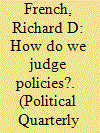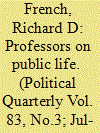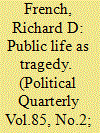|
|
|
Sort Order |
|
|
|
Items / Page
|
|
|
|
|
|
|
| Srl | Item |
| 1 |
ID:
130947


|
|
|
|
|
| Publication |
2014.
|
| Summary/Abstract |
Political science has paid scant attention to the way that citizens judge public policy, assuming that citizens do so, or should do so, in ways familiar to academics themselves, depending upon which of the various schools of thought they endorse. This paper argues that approaching citizens' judgement realistically requires attention to political psychology. Indeed, our conception of citizen judgement can be enriched by attention to research and theory in cognitive psychology and neuroscience. That work emphasises that much judgement occurs spontaneously and very rapidly, that it is involuntary and non-semantic and that it depends upon the emotional impact of experience rather than conscious weighing of situations against explicit standards of assessment such as science, self-interest or moral theory. A moral psychology for public life is sketched out, with implications for judgment by politicians.
|
|
|
|
|
|
|
|
|
|
|
|
|
|
|
|
| 2 |
ID:
117491


|
|
|
|
|
| Publication |
2012.
|
| Summary/Abstract |
Many academics misunderstand public life and the conditions under which policy is made. This article examines misconceptions in three major academic traditions-policy as science (e.g., 'evidence-based policy'), normative political theory, and the mini-public school of deliberative democracy-and argues that the practical implications of each of these traditions are limited by their partial, shallow and etiolated vision of politics. Three constitutive features of public life, competition, publicity and uncertainty, compromise the potential of these traditions to affect in any fundamental way the practice of politics. Dissatisfaction with real existing democracy is not the consequence of some intellectual or moral failure uniquely characteristic of the persona publica, and attempts to reform it are misdirected to the extent that they imagine a better public life modeled on academic ideals.
|
|
|
|
|
|
|
|
|
|
|
|
|
|
|
|
| 3 |
ID:
133240


|
|
|
|
|
| Publication |
2014.
|
| Summary/Abstract |
Some of the most perceptive observers of public life have emphasised its tragic dimensions, not so much out of sympathy for politicians, but because the lens of tragedy offers a unique insight into the realities of the world of politics. Here I attempt to synthesise this tragic perspective by employing the comments of those best positioned to identify the salient features of public life, its primary dramatis personae. Politics occasionally provides us with the kind of spectacular catastrophe that journalists like to construe as tragedy. But our purpose is to evoke a different, more personal, less visible kind of tragedy: the small but malignant tragedies of self-betrayal, of inflation of the ego and deflation of conscience, of helpless witness to injustice and misfortune, of status unaccompanied by power or efficacy, of the shrinking of aspiration to the scale of the practicable, of disillusion and, on occasion, of despair.
|
|
|
|
|
|
|
|
|
|
|
|
|
|
|
|
|
|
|
|
|